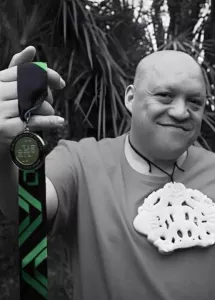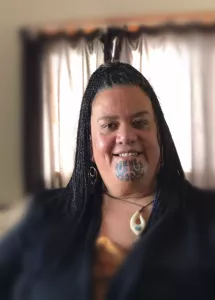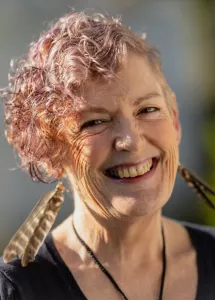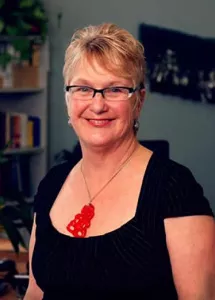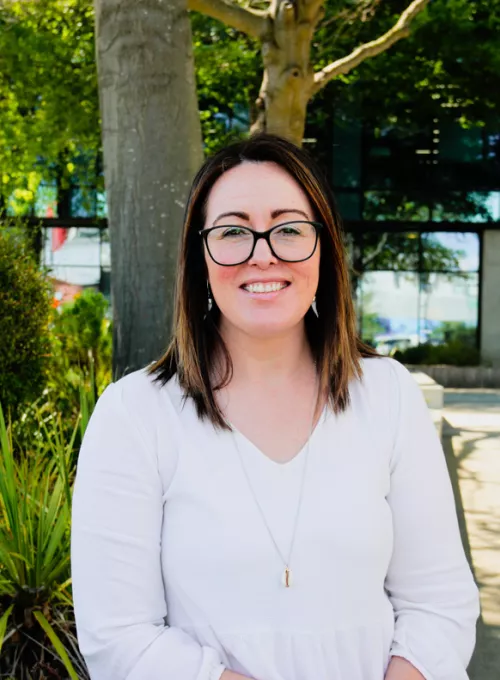
Jeanine actively contributes to advancing well-being aspirations for her whānau, hapū and iwi Māori.
Jeanine is passionate about using social innovation to advance equity in health and education. She has committed much of her life to working across iwi, government, and Non-Government Organisations sectors to advance employment, youth development, Te Reo Revitalisation, Health, Education and Environmental Outcomes for Māori.
Born in Ōtepoti with a strong connection to her papakāika, Ōtākou, Jeanine credits her whānau and some very special wāhine Māori (including her late Aunty Rānui Parata-Taiapa – one of the first Māori midwives in Ōtepoti) as an important source of inspiration and motivation throughout the years.
Through their mentorship and support, Jeanine has dedicated much of her career to improving the systems that whānau Māori participate and engage in so that they are better enabled to flourish and succeed as Māori.
Maintaining a focus on child and maternal health for almost 30 years, Jeanine has provided leadership to the sector as the first ever consumer member to be appointed to the position of Co-Chair of both the Ministry of Health’s National Maternity Monitoring Group and the National Maternity and Neonatal Digital and Data Steering Group (Te Whatu Ora). She is also the current Co-Chair for Brainwave Trust Aotearoa and her children’s school board, Te Kura Kaupapa Māori o te Whānau Tahi.
As a lifelong learner, she believes in the value of education and is passionate about improving taiohi Māori participation in education. Jeanine finished secondary school without the qualifications necessary to progress to university, but while juggling babies and mahi, she gained her first undergraduate qualification at 37.
Over the past decade she has acquired a Master of Māori and Indigenous Leadership (with Distinction) from the University of Canterbury, a Bachelor of Māori Development from AUT, a Diploma in Te Pīnakitanga ki te Reo Kairangi from Te Wānanga o Aotearoa, is a First Nations’ Futures Fellow from Stanford University and was also selected to participate in the inaugural Te Hononga Māori Graduates Study Tour to Oxford (2022).
Jeanine currently works as the Tuia Te Herenga Initiative Lead at Environment Canterbury, leading the strategic change programme for the Te Tiriti partnership with Kāi Tahu. Before this mahi, she was the Kaihautū Taunaki Kaupapa | Director – Projects & Innovation for the University of Canterbury’s Te Waka Pākākano | Office of Māori, Pacific and Equity.
While in this position, she created the Takere Academy, a five-week academic programme for new-to-university Māori and Pacific students. The academy was designed to support ākonga with their transition into and preparation for tertiary study. Ākonga stays in a hall of residence over the summer break and is provided with opportunities that help them to navigate university systems, complete a first-year paper and create relationships with the wider UC whānau before they begin their academic year. The aim of Takere is to provide ākonga with the necessary tools to ensure their success at UC as Māori and Pacific students.
Another youth initiative Jeanine co-created with indigenous scientists and practitioners based in Hawai’i is Te Pōkai Ao ki Hawai’i. Te Pōkai Ao is an indigenous STEM programme and cultural exchange for taiohi Kāi Tahu to increase their understanding of STEM from indigenous perspectives through engaging in Mahika kai (food gathering systems, practices and places).
Drawing on tīpuna stories of navigation and migration, Te Pōkai Ao is an opportunity for taiohi to explore indigenous knowledge, become familiar with pūrākau Kāi Tahu, and strengthen their understanding of how indigenous innovation can play a significant role in strengthening positive social, cultural, and environmental outcomes for indigenous communities.
The programme promotes a connection to place-based knowledge and provides a stronger context for implementing science, technology, engineering, and mathematics through an indigenous lens. Te Pōkai Ao intends to empower taiohi Kāi Tahu to see themselves as future disrupters and pioneers of change to dissolve indigenous people's challenges, such as food security, reo revitalisation and cultural regeneration.
But Jeanine’s most significant achievement is being the proud māmā to six reo-speaking tamariki (five birthed and one borrowed). As a second language learner who has raised her tamariki in Te Reo Māori as their first language, she is committed to the intergenerational transmission of te reo in the home. She is excited to welcome two new mokopuna in 2024.
Mō tātau, ā, mō kā uri ā muri ake nei.
Links:
Māori and Pacific students get a “jumpstart” into university life with new scholarships.
SUDI presentation – Jeanine Tamati-Elliffe
Teenagers use downtime to build up Te Reo
Quit campaign puts family first
Jnl-59-2023-article-3-students-during-Covid-lockdown.pdf (midwife.org.nz)
